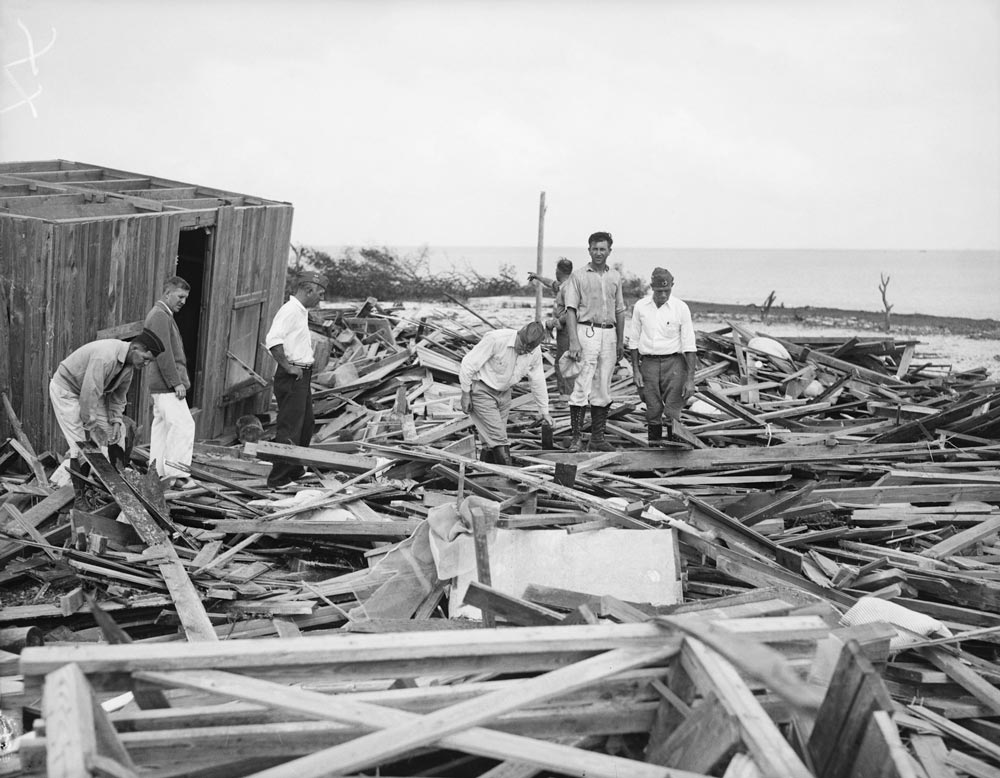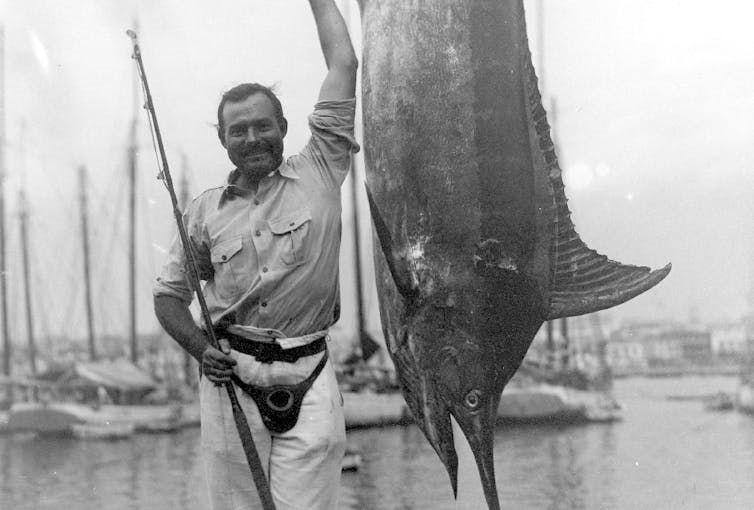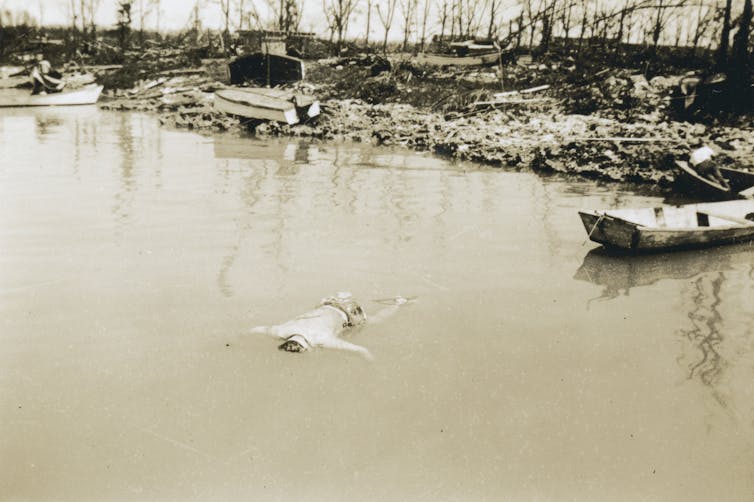
By Verna Kale
The 2024 hurricane season has been especially disastrous, and the casualties and widespread damage from flooding and high winds in towns like Cedar Key, Florida, call to mind another historic hurricane, the Labor Day hurricane of 1935.
As one of the editors of “The Letters of Ernest Hemingway Volume 6 (1934-1936),” with Sandra Spanier and Miriam B. Mandel, I am reminded of the eyewitness account that the writer, then a resident of Key West, Florida, gave of the catastrophic storm that leveled Upper Matecumbe Key and Lower Matecumbe Key and took the lives of more than 400 people, many of them World War I veterans.
Then, as now, the aftermath of a natural disaster included political finger-pointing.
Today the debates center around how resources from the Federal Emergency Management Agency are allocated or how climate change contributes to the intensity of the storms.
Back then, Hemingway had a different beef with the government, blaming the deaths of hundreds of World War I veterans on the failure to evacuate Upper Matecumbe Key and Lower Matecumbe Key ahead of the storm.
The calm before the storm
Hemingway was no stranger to hurricanes.
A serious deep-sea angler who fished the waters off Florida, he kept an eye on weather patterns. Hurricane season was an anticipated, if dreaded, annual event.
“Now the lousy hurricanes are starting,” he wrote his friends Jane and Grant Mason in June 1934. “Wish we would get lots of east wind and current … and then have a fine july and august without hurricanes.” Knowing that these conditions were unlikely, he jokingly asked the Masons “and what do you want for xmas Mr. and Mrs. Mason yourselves?”

Ernest Hemingway Collection. John F. Kennedy Presidential Library and Museum, Boston.
In a Sept. 30, 1934, letter, he wrote friends Gerald and Sara Murphy with hopes that he would get through the rest of hurricane season without incident: “no hurricanes yet […] if we get through the next 20 [days] are all right,” and he was glad that he “can fish without having to tie [the boat] up somewhere up some creek.”
The next day, he wrote to fellow novelist John Dos Passos, “Hurricane months if you dont get a hurricane are fine.”
‘Not a building of any sort standing’
But the following year, when the hurricanes did come, it was not fine.
Over Sept. 2-3, 1935, a hurricane made landfall in the Florida Keys. Occurring in the days before storms were given names, the Labor Day hurricane, as it is commonly known, was the first recorded Category 5 hurricane in the U.S.
It remains the third-most intense storm on record in the Atlantic basin, with a barometric pressure drop to 892 millibars and wind gusts exceeding 200 mph. Much of its damage was caused by the storm surge, and the Overseas Railroad, which had been completed in 1912 and connected the Florida Keys to the mainland, was destroyed and would not be rebuilt.
After the storm, Hemingway wrote to his editor, Maxwell Perkins, describing its aftermath.
Though communications were down and the island was cut off from the mainland, Key West had sustained relatively little damage.
Upper Matecumbe Key and Lower Matecumbe Key, however, were a different story.
“Imagine you have read about it in the papers but nothing could give an idea of the destruction,” Hemingway writes. “The foliage absolutely stripped as though by fire for forty miles and the land looking like the abandoned bed of a river. Not a building of any sort standing. Over thirty miles of railway washed and blown away.”
Worse yet were the human casualties: He notes that the last time he witnessed so many dead in one place was in Europe during World War I as a Red Cross ambulance driver, adding, “We made five trips with provisions for survivors to different places and nothing but dead men to eat the grub.”

Ernest Hemingway Collection. John F. Kennedy Presidential Library and Museum, Boston.
Many of the victims were veterans, employed by the Federal Emergency Relief Administration to work on the Overseas Highway construction project. Outraged by the federal government’s failure to send a train to evacuate the workers in time, Hemingway tells Perkins that the veterans “were practically murdered.”
Federal administrators, he adds, “had all day Sunday and all day monday to get those vets out and never did it. If they had taken half the precautions with them that we took with our boat not a one would have been lost.”
The letter contains graphic descriptions of the hundreds of dead bodies, rapidly decomposing in the Florida sun as they awaited transport to Arlington, Virginia, to be buried.
‘That smell you thought you’d never smell again’
Hemingway would repeat many of these same details in an article published in the Sept. 17, 1935, issue of the leftist magazine The New Masses.
The article, which Hemingway titled “Who Killed These Men?,” and which was re-titled by the editors as “Who Murdered the Vets?,” criticized the federal government for not evacuating the workers.
“Who sent nearly a thousand war veterans … to live in frame shacks on the Florida Keys in hurricane months?” Hemingway asks.
Hemingway, no stranger to the sight and smell of the dead from his experiences during World War I, was disgusted not merely by the bodies “swollen and stinking” but by what brought the veterans to the work camps to begin with.
Skeptical of the various government programs of Franklin D. Roosevelt’s New Deal, Hemingway saw the Federal Emergency Relief Administration work camps as a way for Washington to conveniently rid itself of hundreds of down-on-their-luck veterans, many of whom were experiencing what we would now call post-traumatic stress disorder.
“I would like to make whoever sent them there carry just one out through the mangroves, or turn one over that lay in the sun along the fill, or tie five together so they won’t float out, or smell that smell you thought you’d never smell again, with luck,” Hemingway writes.
This impassioned response to the disaster in 1935 still resonates. Hemingway recognized that while storms are inevitable, mass casualties do not have to be. The government can’t control the weather, but it can fulfill an obligation to protect the most vulnerable in the path of the storm.
![]()
Verna Kale is Associate Editor of The Letters of Ernest Hemingway and Associate Research Professor of English at Penn State.






























Pogo says
@Soylent Green is people
As bad as 2024 has been, it is only a glimpse of the future. The very near future.
“I smell blood and an era of prominent madmen.”
― W.H. Auden